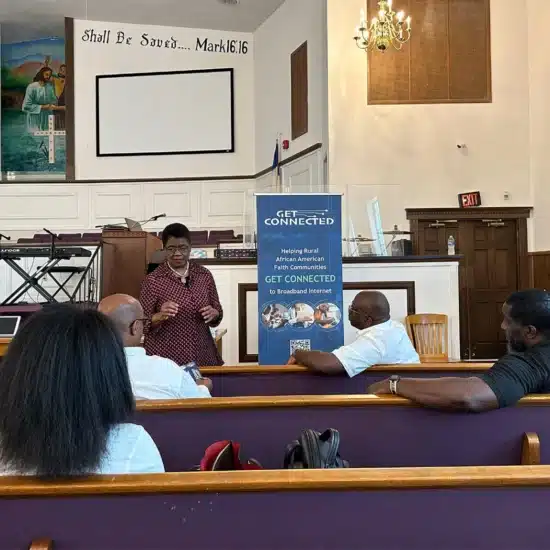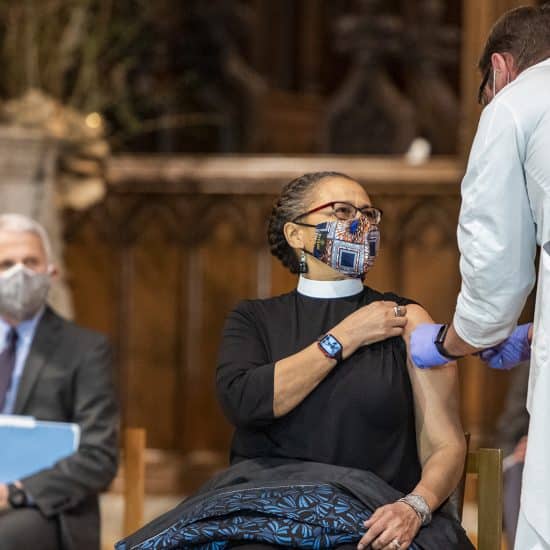It takes a village — churches, food pantries, food banks, groceries, foundations, volunteers and others — to feed the hungry and hurting in the nooks and crannies of America’s urban areas, smaller towns and rural communities.
Metropolitan Missionary Baptist Church is a predominantly black congregation that sits in the midst of an area of Kansas City, Mo., in which many people have been affected by poverty. The church ministers to its own members and to people just outside its walls, but leaders acknowledge they can’t do it alone.
Farther south, in the suburban community of Stilwell, Kan., leaders of First Baptist Church have come to the same conclusion as they reach out to the less fortunate surrounding them, particularly as they try to meet the needs of hungry families through a food pantry and a large community garden.
Both the Mercy Ministry (food and clothing pantry) at Metropolitan and the Caring Ministry at First Baptist, Stilwell, rely heavily on Harvesters, the massive food bank that serves 26 counties in northwestern Missouri and northeastern Kansas.
By its own description, Harvesters provides “food and related household products to more than 620 not-for-profit agencies including emergency food pantries, community kitchens, homeless shelters, children’s homes and others,” according to its website (www.harvesters.org).
One of Harvesters’ goals is to increase community awareness of hunger and teach about good nutrition, but entities like the food pantries at Metropolitan and First Baptist depend upon the bank for a steady supply of food supplies, week in and week out.
Food banks do not distribute food directly to individuals or families, but they distribute large amounts to community and church-based pantries across the region. They pass along food for pennies on the dollar and sometimes at no cost. It is the only way the vast majority of their recipient agencies could manage to help as many hungry families as they do.
Like pantries, food banks also rely heavily on volunteers for warehousing food supplies, sorting them efficiently and then helping distribute them to direct-distribution points like pantries.
For food pantries, securing and maintaining supplies of food to give away is a constant challenge. “We use other community services that are available,” said Marian Halim, Metropolitan’s facilitator of various mission programs. The church and its members do what they can, but they need help.
A large Harvesters facility sits within a block of the inner city church.
First Baptist Caring Ministry Director Donna Rains said Harvesters trucks usually carry 7,000 to 18,000 pounds of food as they make their rounds and make drops to places like Stilwell. The pantry team depends upon the food bank and finds itself scrambling if for some reason its facility does not receive a Harvesters drop for a given distribution at the church.
Another of the partners of food pantries is grocery stores, which regularly distribute bread at the end of a day while it is still useful to the families who need it.
Both ministries acknowledge that churches doing their own food collection and distribution alone simply will not be effective. Both rely on cooperation with other congregations. At Stilwell, 15-20 area churches of various faith traditions drop off nonperishable food items regularly to benefit the food pantry and enable it to serve increasing numbers of families.
At Metropolitan, “We have a good relationship with many partners and many kinds of partners,” Halim said. “We work with three different neighborhood associations. We have a good working relationship with nearby churches.”
Metropolitan has learned that in its urban setting, various churches work diligently to share mutually beneficial information. When a church is short on supplies, it refers the less fortunate to one of the nearby church pantries. And vice versa.
Willa Jones, Mercy Ministry coordinator at Metropolitan, says relationships within the community are invaluable, in part because it is an important way for her to keep her pulse on the community’s needs and to maximize precious resources. And to help make sure no one who needs help falls through the cracks.
Leaders at both churches point to their volunteer teams as indispensable resources. “We have wonderful volunteers,” Rains says of her workers. Halim and Jones at Metropolitan are themselves example of long-serving volunteers who hold the fellow volunteers who work directly with them in high esteem.
All three point to a willingness of volunteers to do the work and to do it with care and compassion. And many of the volunteers have been at their pantry duties for several years. They value helping the less fortunate.
Metropolitan’s Jones says she is grateful “to be able to work with such a wonderful, faithful and dedicated group” who work on her team.






